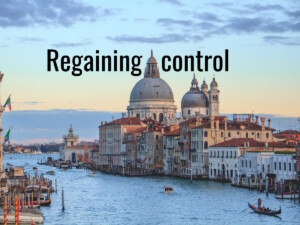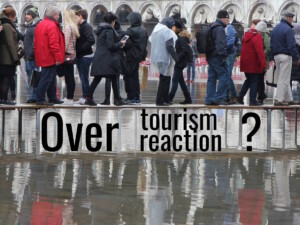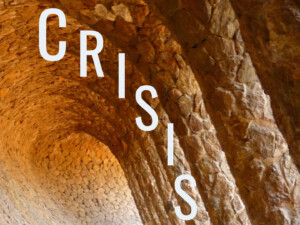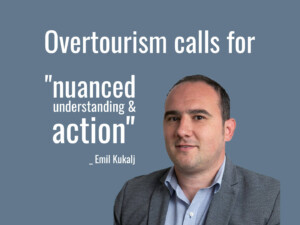Venice ‘bookable’: Italians lose freedom of movement
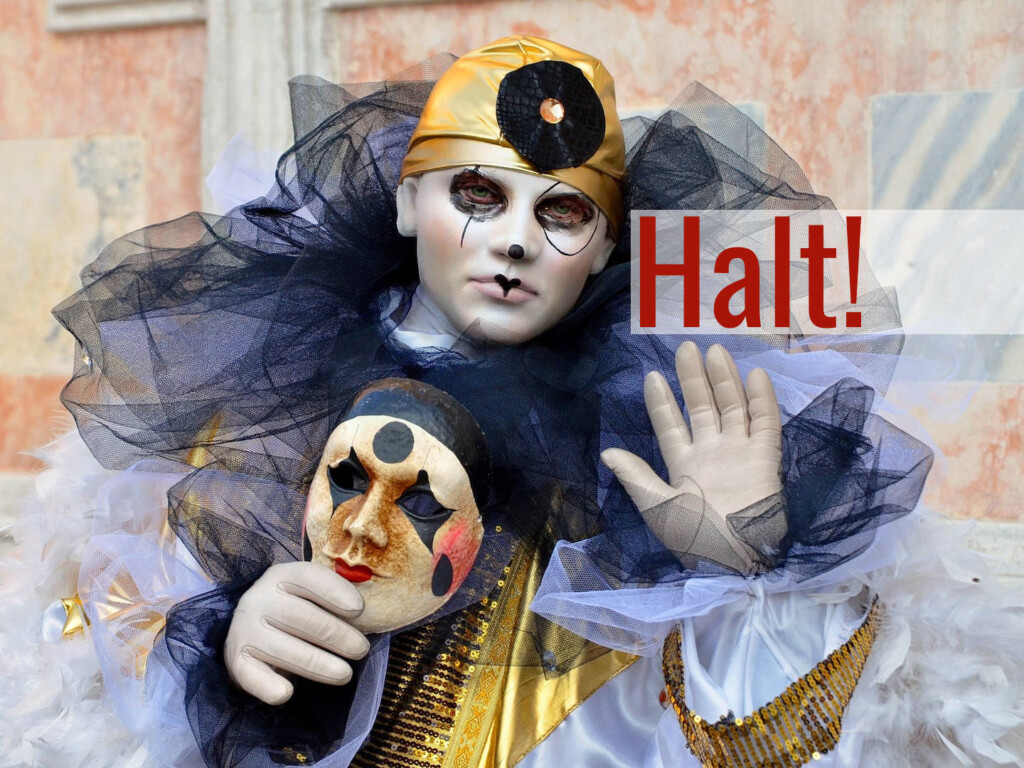
Are Venice’s new day-tripper rules having the desired effect? Or are they unreasonably restricting Italians’ freedom of movement?
This is Dominic Standish’s second “Good Tourism” Insight at the invitation of Tourism’s Horizon, a “GT” Insight Partner.
[You too can write a “GT” Insight. Your organisation can also become a “GT” Partner.]
Contents
Bookings and fees
Since April 25, 2024, Venice City Council has made it mandatory for day-trippers to book to enter the city. Booking is required on 29 days this year. The first period ran from April 25 to May 5.
In addition to booking to enter the city, many day-trippers must pay a EUR 5 (~USD 5.40) daily entry fee or risk fines between EUR 50 and EUR 300. The fee and booking apply if day-trippers enter the city between 8.30 am and 4.00 pm. People can book online or at kiosks in the city and there are random checks by appointed officials.
Travellers who stay overnight in the Municipality of Venice, and pay a tourist tax, do not need to pay the entry fee. Venice residents are exempt. Veneto region residents must book and do not pay. But people from other Italian regions have to book and pay.
I explain the exemptions, dates, and how the booking system operates in this article. Now that it is in effect, the dates, times, and fees for entry can easily be changed … for better or worse. And while there is currently no limit on the number of day-trippers or other travellers who can enter Venice during designated times, this too can change.
An unprecedented response to ‘overtourism’
“It is the first time in the world that you do something like this, you make a city bookable,” declared Venice Mayor Luigi Brugnaro.
Of course, many popular tourist destinations charge entry fees, including the Galapagos Islands. Bali charges a one-time entry fee. Japan has a departure tax. Many other places have tourist taxes, usually as a surcharge on accommodation.
Such fees are often linked to claims about ‘overtourism’. Venice Mayor Brugnaro stated, with reference to the booking system, “overtourism is not a problem that only concerns this city”. Indeed, making Venice bookable was suggested by Brugnaro in the aftermath of the city experiencing high volumes of day-trippers during Easter 2022.
Also read Dr Dominic Standish’s “GT” Insight: ‘Mass tourism in Venice: Are city officials overreacting?’
‘No to ticket for Vene-Land’
Although many places charge fees for tourists, Venice is setting a unique precedent because it is the first city that requires booking to enter on certain dates at specific times. This makes Venice feel more like a theme park than a city.
At protests in Venice on the first day of the bookable system, a banner was displayed including the slogan ‘No to ticket for Vene-Land’, comparing the city’s new status to Disneyland. Another read ‘No to the ticket, yes to houses and services for all’ at the front of approximately 300 demonstrators who clashed with police.
While the bookable system has been framed as a response to overtourism, Venice is a living city with a wide variety of functions beyond tourism. Other aspects of city life, and local people, are being negatively impacted by this system.
On April 28, 2024 Pope Francis came to Venice and presided over mass on St Mark’s Square. People from the Veneto region who wanted to attend needed to book to do so if entering during the designated times. People entering from other Italian regions were required to book and pay the fee.
Similarly, two days later, a ceremony was held for 700 new graduates of Venice University on St Mark’s Square. Family members and friends of these graduates from the Veneto region had to book. Those from other regions booked and paid for the day.
Also read Anna Richardot’s “GT” Insight: ‘Regaining control: Venice takes ‘smart’ measures to manage mass tourism’
Venice has set a dangerous precedent
Local people are suffering restrictions on many aspects of their lives due to fears about overtourism. Despite perceptions that making Venice bookable may reduce the number of foreign tourists, the reality is that this system is having more impact on local people.
As a resident of the Veneto region who often visits the city, I have observed that most day-trippers on busy days are usually Italians. Simone Venturini, Venice’s city councillor for tourism, confirmed that the booking system was principally to deter day-trippers from the Veneto region visiting the city: “Yes, the majority are from Veneto and are exempt, but the fact they still have to go online to confirm this is a way to disincentivise them.”
There are many complicated exemptions to booking and paying to enter Venice. Venetian residents may apply to Venice City Council to make their friends exempt. However, this means the Council has the right to regulate and record what should be private relationships.
Freedom of movement into Venice is no more on certain days and times. While these dates and times are limited, this could change. There is no threshold for the number of day-trippers or other travellers who can enter Venice during these times, but this too could change. Likewise, the fee could increase, which has already been mooted for busy days.
By making Venice ‘bookable’ through claims about overtourism, Venice City Council has uniquely established the principle that it can prohibit anyone from entering the city, including Italians. As local people are experiencing, this has set a dangerous precedent against freedom. Other cities and places should reject the idea.
Don’t miss other “GT” content tagged ‘Carrying capacity, mass tourism, and overtourism’
What do you think?
Share your own thoughts about Venice’s tourism strategy, policy, and governance in a comment below. (SIGN IN or REGISTER first. After signing in you will need to refresh this page to see the comments section.)
Or write a “GT” Insight or “GT” Insight Bite of your own. The “Good Tourism” Blog welcomes diversity of opinion and perspective about travel & tourism, because travel & tourism is everyone’s business.
“GT” doesn’t judge. “GT” publishes. “GT” is where free thought travels.
If you think the tourism media landscape is better with “GT” in it, then please …
About the author

Dominic Standish has lived in the Venice region since 1997.
A lecturer at the University of Iowa, Dr Standish is the author of Venice in Environmental Peril? Myth and Reality (UPA, 2012), with updates at dstandish.com and on Twitter.
Featured image (top of post)
Are Venice’s new day-tripper rules and regulations having the desired effect? Or are they unreasonably restricting Italians’ freedom of movement? Venice carnival masks image by Leo (CC0) via Pixabay. “GT” added “Halt!”.


